| |
"How many actors have you destroyed, as you destroyed me? How many talented lives have you cut down with your glib attacks? What do you know of the blood, sweat and toil of a theatrical production? Of the dedication of the men and the women in the noblest profession of all? How could you know, you talentless fools, who spew vitriol on the creative efforts of others because you lack the ability to create yourselves?" |
| |
Actor Edward Lionheart to theatre critic Peregrine Devlin |
He has a point, of course. At a time when just about everyone is a critic, there are still precious few people writing full-time criticism who have actually worked in their medium of their chosen focus. Just occasionally critics go on to be filmmakers of some note themselves – Jean-Luc Godard, Paul Schrader, Christopher Petit, et al – but rarely does it work the other way round. Could it just be that persuing a career in the arts is more fulfilling than sniping at the work of those who do? As writers of film criticism, we may start out with the best of intentions, the desire, perhaps, to make others aware of works that have excited us in the hope that they will want to see them as well. That was certainly my main motivation when I first launched this site. But sooner or later we'll encounter a work that annoys us in some way, and we have a critical dig. Yet as someone who has written long and detailed reviews for this site and has also worked on a few films, I can assure you of one thing: the longest, most meticulously researched and carefully worded review requires only a fraction of the time and effort that is required to produce even the most slapdash movie. The more notable critics have, in their time, wielded far more power that they rightly deserve to and have even helped bring notable careers to an end. Is it any wonder that artists intermittently entertain the thought of killing us all off?
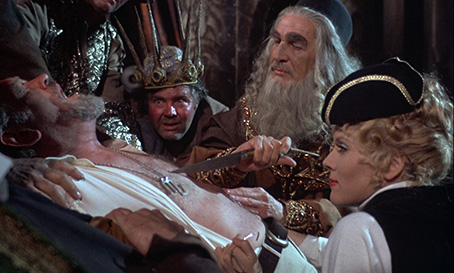
This notion is at the heart of the 1973 Theatre of Blood. The title has Hammer written all over it (and is not as witty as the original title, 'Much Ado About Murder'), and the film itself was made in the twilight period of the studio's heyday. But Theatre of Blood is not a Hammer film, no siree. That it is a horror film is firmly established in the first ten minutes, but it's also a black comedy, and it scores a bulls-eye on both counts. There are scenes that will make you wince, others that will make you laugh out loud, a few that will make you do both in space of a few exquisitely judged seconds. But there's more. Oh, there's so much more.
Let's start with the plot. It's the annual get together of the London Theatre Critics' Circle, a self-satisfied collection of opinionated nitwits who appear to hold each other in the sort of contempt that they'd usually reserve for a play that didn't meet with their exacting approval. All are present except George Maxwell, and only we know why. Earlier, you see, he was asked by the police to meet them at a derelict property he owns to help clear out a group of homeless drunks. When he arrives, the drinkers cut him to shreds while the two attending policemen just stand by and watch. Before Maxwell expires, one of the policemen reveals himself to be actor Edward Lionheart, who was thought to have died when he threw himself into the Thames after being snubbed for a Critics' Circle award that he believed he deserved. The critics never liked Lionheart, in part because he refused to play anything but Shakespeare, and repeatedly gave him bad reviews. When a second and third critic fall victim to Lionheart's vengeful hand, their nominal leader Peregrine Devlin realises that his colleagues are being killed in the manner of the Shakespeare plays of Lionheart's fated final season.
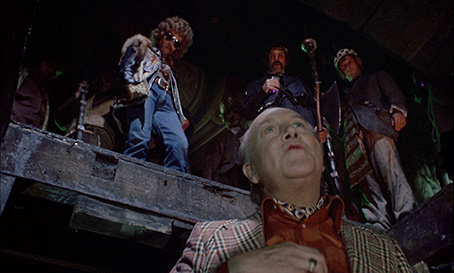
It's an inspired premise, one devised by the film's producers, Canadian Stanley Mann and American John Kohn, and deliciously developed by an Australian writer of precious few credits, Anthony Greville-Bell, whose script was doubtless a key attraction for the pool of actors that has been assembled here. And what a pool it is. Seriously, check out this roster of British theatre and film talent of the time: Ian Hendry, Harry Andrews, Coral Browne, Robert Coote, Jack Hawkins, Michael Hordern, Arthur Lowe, Robert Morley and Dennis Price. And these are just the critics, a string of respected actors gathered in one film for no other reason than to dispatch them each in a horrible manner. Yet all of them clearly enjoyed their roles, from Robert Morley's camp twittering about his pampered "doggie-woggies" to Harry Andrews' sleazy middle-aged lechery and Arthur Lowe's gruff exasperation at the bossiness of his wife. As pack leader Devlin, Ian Henry gets to play it relatively straight and is probably the least objectionable of the bunch, which from an early stage marks him as the one member of the Circle who might just be able to sidestep the fate Lionheart has devised for him.
But there's even more. Investigating officer Inspector Boot is played by favourite Irish character actor Milo O'Shea in a state of constant agitation and is dutifully assisted by English comic favourite Eric Sykes as Sergeant Dogge. Sykes in particular shows a lovely command of low-key comic timing here, whether it be stifling an inappropriately timed guffaw, his overly phonetic pronouncement of Boot's codename "For-tin-bras", or his disappointment at being cut short by his distracted boss just before his reading of Shakespeare looks set to give him a moment in the intellectual sun. And as Lionheart's devoted daughter Edwina, a bewitching Diana Rigg firmly shuts the door on her time as the iconic Emma Peel with a role that requires her to sell her character alternately as a concerned and devoted daughter, a cynical critic hater, a ditsy seductress, a cold-hearted revenger and more, sometimes in the space of a single scene, all of which she handles with confident aplomb.
But despite finding himself in such exalted company, the film rightly belongs to Vincent Price, who absolutely revels in the role of Shakespearian ham Edward Lionheart. And why wouldn't he? A confirmed anglophile with a passion for Shakespeare, Price here was able to work with a cast of respected British thespians and perform passages from plays that he never had the opportunity to play on stage. He also got to have fun with a range of characters and accents, from the French chef who convinces Meredith Merridew that he has been selected for a TV reality show entitled This is Your Dish (a double gag given Price's famed love of cookery) to effete and ginger afro-haired hairdresser Butch, who asks the Circle's sole female member Chloe Moon (Corale Browne, whom Price was secretly dating and later married) to let him do something "camp" with her hair such as "flame, with ash highlights," before tying her to the chair and wiring her up to the electricity supply.
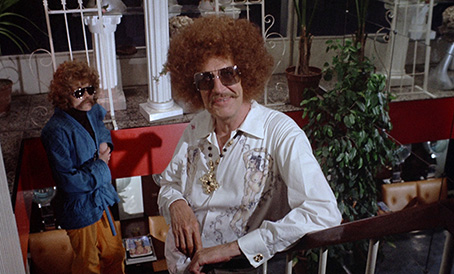
But underlying this is a performance of real sincerity laced with playful amusement, a combination delightfully captured in a string of deliciously offbeat bits of business by Price, but showcased best in the joyously staged sequence where Lionheart confronts Devlin in an empty gym, his face hidden under the grill of a fencing mask. Having drawn him into a fight with an accent only two steps from the one employed by John Cleese on the castle battlements in Monty Python and the Holy Grail, he reveals himself to a startled Devlin. What follows is, perhaps inexplicably, my favourite moment from the film. "Lionheart!" Devlin barks in alarm, to which his opponent jubilantly responds, in a deliberate misquote from Romeo and Juliet: "Alive in Triumph! And you thought me slain!" The furiously energetic swordfight that follows is the nearest the film comes to an all-out action scene* and reaches a comical peak as the pair leap over a balcony and continue to battle on trampolines, while Michael J. Lewis's splendid score glides into full adventure film overdrive, almost transforming the scene into an outtake from The Adventures of Robin Hood. But by the end the tone has shifted, as Lionheart administers wince-inducing cuts to Devlin's chest and delivers the top-quoted speech with righteous fury, and you are left with the feeling that this scripted dialogue comes very much from the heart. Here Lionheart is not just speaking for himself, but for every actor who has every received a bad notice anywhere.
As a black comedy, Theatre of Blood manages to be deliciously funny without skimping on the horror, much of which is strong enough to have stood the test of time and still feels grisly today: a body dragged face down over gravel behind a galloping horse; a lance thrust into a chest hard enough to burst through the victim's back; a freshly rendered heart that is still warm enough for steam to escape it as it is lifted into the cool air in which the operation took place; a man force-fed a through a funnel until he chokes to death, made all the more grisly by the claustrophobic manner in which it is filmed. Indeed, it is the confidence and inventiveness of Douglas Hickox's direction, which is well served by Malcolm Cooke's super-smart editing decisions and the creative angles and lens choices of Wolfgang Suschitzky's cinematography (I could write a small essay on their work on Meredith Merridew's death scene alone), that have helped to give the film its impressive longevity. And were it not for the fact that I can find no evidence to confirm this, I'd swear that the extraordinary face masks being waved in the climactic scene had been created by an uncredited Gerald Scarfe.
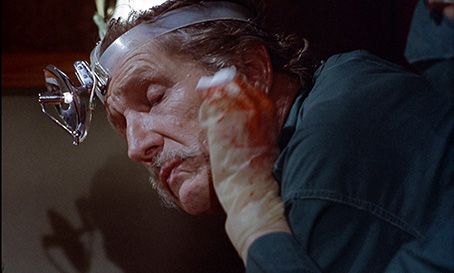
But it's the moments when the comic and the horrific meet head-on that have made the film such a fan favourite, some of which walk such a delicate line that it's hard to imagine them working half as well with a different cast and crew (take note, any witless opportunist who might be even considering a remake). This is exemplified by the scene in which Lionheart surgically beheads one of the critics in his own bed, a grim and bloody procedure that still prompts snorts of laughter, for the hurried use of a bed pan to collect the fountaining blood, for the moment when Price pauses to non-verbally ask his assistant to mop his brow, and for a score that eschews the sinister in favour of romantic strings inspired by the theme tune to Dr. Kildare. And it deserves a place in history for being the only film I can name that has an end credit for the role of "Choreographer of Meths Drinkers".
The HD transfer here is the result of a restoration created from original film elements by MGM in the US, as indicated by the American spelling of the title ('Theater' instead of 'Theatre'). A fair few dust spots do remain and the odd small bit of damage, there is some very mild flickering still detectable in places, but in every other respect this is a first class job. The image is otherwise clean, the contrast generally very good and the black levels solid throughout, but shadow detail is not noticeably lost in the process. The level of detail exceeds my expectations, but ain't that so often the way for a film you first encountered on standard def TV. On the close-up of Edwina in the sequence where she talks to Devlin in the back of a car, almost every stritch on her sweater is crisply visible. Colours are warmly rendered, with pastel shades and primes being particularly attractive. A fine film grain is visible and there are no obvious signs of digital enhancement.
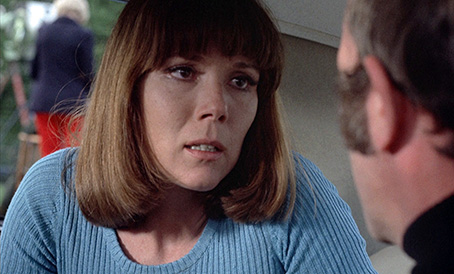
The Linear PCM mono soundtrack is not quite as sparkly. There are no obvious traces of damage and the dialogue, music and effects are all clear enough, but the dynamic range is narrower than I would have expected – there is not too much life at either the bass or treble end of the scale – and a detectable background hiss when things get quiet.
Optional SDH English subtitles for the deaf and hrad of hearing are included.
Audio commentary with The League of Gentlemen – Jeremy Dyson, Mark Gatiss, Steve Pemberton and Reece Shearsmith
Now I'll state up front that I don't usually enjoy commentaries in which people who weren't involved in the film's production jokily pass comment on what they are watching. But all four gentlemen here are huge fans of the film and of the horror genre in general, and at it's best this furiously busy commentary is like sitting down with your best friends to talk about a movie on which you are all united in your enthusiasm. They're not above picking holes in the things that we all know don't quite work (the final climb to the theatre rooftop where the stunt double and his pre-prepared handhold are clearly visible), but do so with affection and sympathy for the difficulties the filmmakers must have faced. They do occasionally wander off the point and start cheerfully exchanging stories that require a few degrees of separation to connect back to the film, but their fan-boy enthusiasm is impossibly infectious, and some of the anecdotes are an absolute hoot – two involving Laurence Olivier had me laughing out loud. I was delighted to discover that their show's village shop catch phrase "We'll have no trouble here!" was taken from Michael Horden's opening confrontation with the meths drinkers, and when news comes that Tim Burton may be preparing a remake of The Abominable Dr. Phibes, the response is in instantaneous and passionate: "Sod off!" Their suggestion that cinema seats should be wired up to electricity in the manner of William Castle's The Tingler in order to kill anyone who sends a text on their phone during a film, in order to "slowly but surely get rid of these type of people", got a cheer from me. A delight.
A Priceless Pot-Boiler: Victoria Price Discusses Theatre of Blood (11:46)
Vincent Price's daughter Victoria (and wow, can you see the family resemblance) recalls with mixed feelings her childhood memories of being in London for the filming of Theatre of Blood. She regards it as one of the key films in her father's career and, save for House of Wax, it's the one that she has re-watched the most in the intervening years. But it was also the film on which Price met and fell for actress Corale Brown (who actually described herself later to Victoria as "her wicked stepmother"), something she and her mother were unaware of at the time. Her enthusiasm for the film itself is undented by this, however, and she provides some persuasive reasons why it was an important work for her father, and one he clearly enjoyed making immensely. She also praises Tim Burton for providing Price such a terrific final role in Edward Scissorhands.
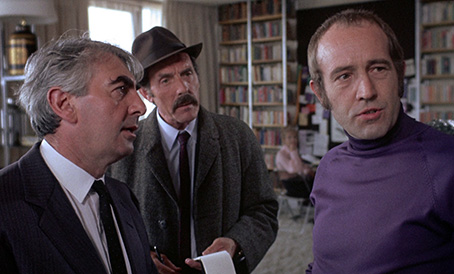
A Fearful Thespian: An Interview with David Del Valle (10:42)
Journalist and film historian David Del Valle, a man who interviewed Vincent Price a number of times, provides his assessment of what he describes as "a unique and wonderful film" and an important one for Price, as it gave him the chance to perform all those parts he didn't get to play in summer stock or on Broadway. He reveals that over time it surpassed Tomb of Ligeia as Price's own favourite of his films, and suggests that one of the reasons for its appeal is that it showed critics to be "pompous, narcissistic, self-serving assholes, which is basically what they were."
Staged Reaction: An interview with Star Madeline Smith (9:21)
A slight misuse of the term 'star' there, surely? Actress Madeline Smith, who has a supporting role in the film as what appears to be the Critics' Circle secretary Rosemary, recalls what she describes as quite a punishing shoot in appalling locations, and describes director Douglas Hickox as a hard taskmaster who shouted a lot, which makes for an interesting comparison with the comments made by Michael J. Lewis below. She remembers picking up on the chemistry between Price and Browne and describes Price as "lovely" and the script as "brilliant", hence her initial eagerness to be on board. She also adored Jack Hawkins, who by this point had lost his larynx to throat cancer and was being dubbed by Charles Gray.
A Harmony for Horror: An Interview with Composer Michael J. Lewis (17:37)
The colourfully attired Michael J. Lewis recalls being cajoled into scoring what was initially sold to him as a horror movie and becoming more interested when he discovered it was actually a black comedy. He describes director Douglas Hickox as "one of the most gracious men I've ever met" and someone who had a great sense of humour, and talks about Hickox's desire to counterpoint the action with music rather than simply enhance it, which remains one of the film's real strengths. He plays (and at one point boisterously sings) two of the main themes, and intriguingly reveals that he had his friend Anthony Burgess (yes, that one) write lyrics for both tunes, which Diana Rigg then recorded with full orchestral support, but the results were for some reason never released.
Original Trailer (2:32)
In reasonable shape and with the British spelling of the title, it's a snappily cut piece but littered with spoilers. Surprisingly, there's no voice-over. It's framed at a cropped 4:3, which tops and tails the names of the supporting cast when they appear.
Booklet
The key feature of the 24-page, full colour booklet that accompanies the disc is an essay on the film and its making by the almost too appropriately named Cleaver Patterson, a detailed and information-brimming piece that should be of considerable interest even to those who know the film well. Also included are extracts from the film's original press book, which include designs for cinema tickets held by a skeletal hand (already redrawn and cut out at this end) and some neat illustrations of the various deaths accompanied by the warning, "This critic didn't like Theatre of Blood".
How satisfying it is to hear on the extra features that my favourite Vincent Price film was also Vincent Price's favourite Vincent Price film. He really is superb here, and I can think of no other genre movie that better showcases his talents. The film as a whole is a sublime blend of horror, comedy and Shakespeare, and on this fine Blu-ray the movie gets the treatment it has for so long deserved. Great transfer, fascinating interviews and a hugely enjoyable commentary. The seemingly unstoppable Arrow hit another home run. Highly recommended.
* And before we pick holes in the likelihood of the actors' skills here, let's remember that as a classically trained actor of the old school, Lionheart would likely have received instruction in fencing as part of his training.
|